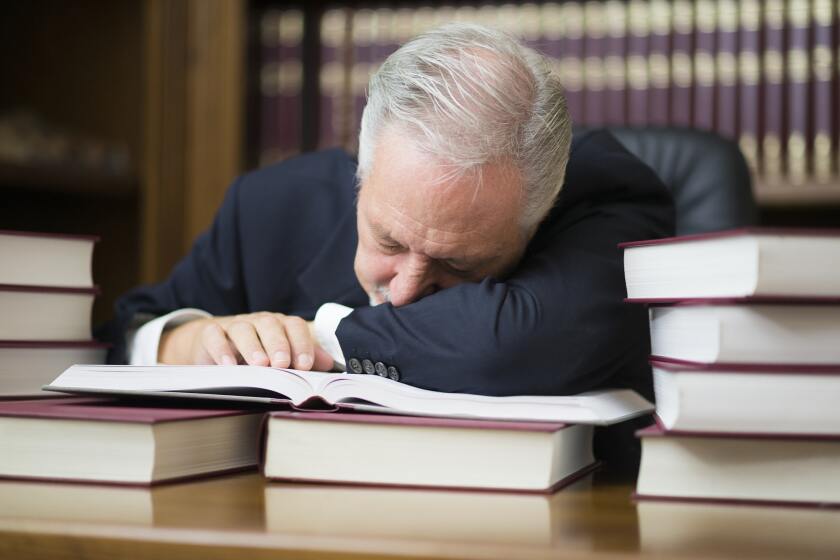If you watch debates from the House of Commons – the lower house of the UK Parliament – there’s a chance you might see somebody looking suspiciously like they have fallen asleep.
It’s a surprisingly common occurrence. The members of Parliament in question could claim they are intently listening of course, though some have admitted to momentarily drifting off.
Clearly, people with hugely responsible jobs and in public-facing positions should not be sleeping on the job, quite literally in this sense.
So, it was interesting to hear that last week a senior judge was issued with formal advice (but didn’t face further sanctions) after he fell asleep during a trial.
According to the Judicial Conduct Investigations Office, His Honour Michael Slater, a circuit judge based at Sheffield Combined Court, apologised and admitted to struggling with an “unremitting workload”.
It’s difficult to say whether I have sympathy or not. I think on balance I do.
The only times I have drifted off on work duty have been after long conferences and usually on the train or plane home rather than during a panel discussion.
But there’s a serious debate to be had here about workload.
If our judges are prone to falling asleep during working hours, should we not reconsider how much we ask of them?
This is not the first time this has happened.
In fact, one intellectual property partner at an international law firm tells me that one of the first large cases he was involved in, at the end of the 1980s, was a complex oil industry patent dispute in which a trial ran for several weeks.
“The judge fell asleep on a number of occasions, and counsel generally dealt with this by ‘accidentally’ dropping a book or knocking over a lever arch file,” he says.
Aside from the lack of professionalism, it can be a dispiriting experience for parties on both sides, who may have invested significant sums in a case and be rightly worried about the outcome or the potential for a re-trial, when the person responsible for the decision falls asleep.
In most IP cases (which usually fall under civil law), judges can’t even rely on members of the jury to listen while they dream of whatever judges dream about.
No details about the latest case have been published, though we do know that Slater’s roles have been in criminal cases, suggesting this was very unlikely to have been an IP matter.
Exhausting schedules
However, conversations with readers and sources of late have revealed that our IP judges are also extremely busy and no strangers to the tough demands of the job.
The partner at the international firm says at the start of his career – around 30 years ago – the understanding was that a judicial role was not that demanding and that judges had ample time to read into cases and write judgments.
Perhaps this made his experience of a sleeping judge all the more frustrating.
However, he notes that since then his overwhelming impression is that expectations have been continually ratcheted up. “I suspect the excuse of ‘unremitting workload’ is entirely valid,” he says.
“This includes the intellectual property courts, although I have never recently seen a sleeping judge, and the standard of justice maintained is world-class largely due to the outstanding work ethic of the judges involved,” he adds.
One litigator source notes that his party had to wait 13 months for the judgment in one trademark case, as the judge hearing the dispute had such a packed schedule.
Recent standard-essential patent disputes centring on fair, reasonable, and non-discriminatory rates have also resulted in some parties waiting for more than a year for a decision.
This is not to suggest that judgments should be rushed, but when judges are juggling multiple cases, it will likely have an impact on their efficiency and mental capacity.
Stakeholders also suffer by having to wait longer than they would like.
It’s worth noting too that many of our IP judges are required to step into other areas of law such as insolvency, which will only add to their workloads.
One source at an IP litigation firm in London points to another factor that might burden IP judges.
Earlier this summer, it was announced that most cases filed in the small-claims track at the Intellectual Property Enterprise Court (IPEC) would be heard in Manchester rather than in London.
From July 3, claims filed in that track, where the disputed amount is no more than £10,000 ($12,600), will be transferred to the Manchester Civil Justice Centre and case-managed by district judges there.
One source suggests this could make it tougher to find judges well-versed in IP and could spark more appeals, which would be taken on by more established IP judges.
“There are appeals aplenty in IP cases that have been decided by non-IP judges at first instance,” he adds.
If our IP judges are continually burning the midnight oil to get through cases, and with the prospect of more work on the horizon, then either a rethink of how cases are divided up or a new hiring spree may be required.
If not, then it may not be long before IP counsel resort to waking up judges by tactically dropping their books or lever arch files again.











